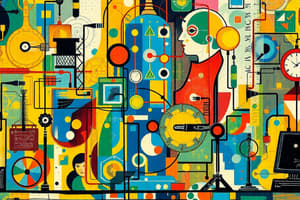Podcast
Questions and Answers
What was the primary objective during the Pre-mechanical Period?
What was the primary objective during the Pre-mechanical Period?
- To enhance telecommunications
- To improve data transmission speed
- To create machines for automation
- To store information (correct)
Which invention is attributed to Blaise Pascal during the Mechanical Period?
Which invention is attributed to Blaise Pascal during the Mechanical Period?
- Pascaline (correct)
- Telegraph
- Analytical Engine
- Phonograph
What marked the key development in the Electromechanical Period?
What marked the key development in the Electromechanical Period?
- The use of stone tablets for information storage
- The creation of the first electronic computer
- The introduction of papyrus paper
- The invention of the telephone (correct)
Who is known as the 'Father of computers' for designing the Analytical Engine?
Who is known as the 'Father of computers' for designing the Analytical Engine?
Which of these was NOT a focus during the Mechanical Period?
Which of these was NOT a focus during the Mechanical Period?
What is the primary purpose of Artificial Intelligence?
What is the primary purpose of Artificial Intelligence?
Which of the following is considered a form of Artificial Intelligence?
Which of the following is considered a form of Artificial Intelligence?
What type of AI is characterized by self-awareness and unpredictable movements?
What type of AI is characterized by self-awareness and unpredictable movements?
What is the definition of biometrics?
What is the definition of biometrics?
Which technology utilizes physics for encoding and decoding information?
Which technology utilizes physics for encoding and decoding information?
Which of the following best describes a weakness in Weak AI?
Which of the following best describes a weakness in Weak AI?
What is the main function of Mobile Technologies?
What is the main function of Mobile Technologies?
Which is a crucial online safety tip provided by security experts?
Which is a crucial online safety tip provided by security experts?
What is Netiquette primarily concerned with?
What is Netiquette primarily concerned with?
Which of the following is an example of a common internet crime?
Which of the following is an example of a common internet crime?
Flashcards are hidden until you start studying
Study Notes
Information and Communications Technology (ICT)
- ICT encompasses all technologies for telecommunication and information access, including both hardware and software.
Evolution of ICT
- Pre-mechanical Period (3000 B.C.E - 1450 C.E): Focused on information storage. Key inventions include stone tablets, papyrus, books, libraries, and the abacus.
- Mechanical Period (1450 CE - 1840 CE): Emphasized automation and faster calculations. Noteworthy inventions include:
- Pascaline: First mechanical calculator by Blaise Pascal.
- Analytical Engine: Designed by Charles Babbage, recognized as the first general-purpose computer.
- Electromechanical Period (1840 CE - 1940 CE): Emphasized using electricity for information transmission. Important inventions include telephones, phonographs, radios, and telegraph machines.
- Electronic Period (1940 CE - Present): Marked by advancements in solid-state technology. Key inventions are vacuum tubes, transistors, integrated circuits, and computer processors.
Emerging Technologies
- Artificial Intelligence (AI): Focuses on mimicking human cognitive functions through algorithms.
- Robotics: Involves creating autonomous devices responsive to sensory inputs, a subset of AI.
- Biometrics: Analyzes human physical characteristics (e.g., DNA, fingerprints, facial patterns).
- Quantum Cryptography: Encoding messages based on physical principles, not mathematical algorithms.
- Computer-Assisted Translation: Utilizes computers for translating between languages.
- 3D Imaging and Holography: Holography uses light to create three-dimensional representations.
- Virtual Reality: Environments generated by computers allowing user interaction and exploration.
Mobile Technologies
- Defined as devices with internet capabilities accessible from any location (e.g., smartphones, tablets, laptops).
- Communication methods include:
- WiFi: Wireless local area network technology.
- Bluetooth: Short-range radio signal transmission.
- Mobile networks: 3G, 4G, GSM, GPRS.
- Data services: Networking services for mobile devices.
- Dial-Up services: Networking via modems and telephone lines.
- VPN: Secure private network access.
Artificial Intelligence (AI)
- AI emulates humans using complex algorithms across various domains, including vehicles and surveillance.
- Learning process involves generalization, reasoning, and problem-solving capabilities.
- Types of AI:
- Weak AI: Focused on a single task (e.g., AlphaGo).
- Strong AI: Self-aware and unpredictable (e.g., fictional Ultron).
- Machine Learning: Data-driven learning processes.
- Point of Singularity: Moment when AI becomes as intelligent as humans.
- AI enhances storytelling and science fiction, demonstrating human-like reasoning.
- Narrow AI: Designed for specific tasks; knowledge is not easily transferable (e.g., ChatGPT).
- Strong AI: Theoretical intelligence that mimics human cognitive ability, encompassing AGI (General) and ASI (Super).
Online Safety, Security, Ethics, and Netiquette
- Common internet issues include cyberbullying, hacking, identity theft, plagiarism, and copyright concerns.
- Security Tips:
- Avoid using one password across multiple accounts.
- Create unique, lengthy passwords (preferably over 15 characters).
- Mix character types; avoid predictable patterns.
- Use password managers and enable two-factor authentication.
Online Ethics
- Netiquette: Guidelines for proper online interaction and behavior.
- Created by network manners expert Virginia Shen, including 10 core rules:
- Be sensitive and humane in online behavior.
- Maintain the same standards as in face-to-face interactions.
- Recognize your location in the cyber realm.
- Respect others' bandwidth; be mindful of their time and resources.
Studying That Suits You
Use AI to generate personalized quizzes and flashcards to suit your learning preferences.




